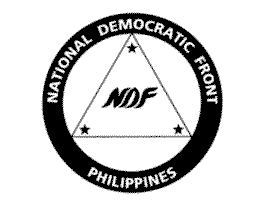National Democratic Front of the Philippines
Negotiating Panel
Statement from NDFP peace panel chair Fidel Agcaoili
NDFP Media Office
December 5, 2016
Lest the Office of the Presidential Adviser on the Peace Process (OPAPP) brand the National Democratic Front of the Philippines (NDFP) a temperamental brat, the NDFP reiterates its appreciation to President Rodrigo Duterte for exercising initiative and political will in effecting the release last August of 19 NDFP consultants and staff and enabling the peace negotiations to move forward.
That being said, there was also a clear understanding as early as May that the four remaining JASIG-protected persons held at the New Bilibid Prisons would soon be pardoned; that all the 400 plus political prisoners would walk free through general amnesty; and that the release of 130 sick and elderly political detainees would be prioritized for humanitarian reasons.
The Government of the Republic of the Philippines (GRP) likewise upheld all previously signed agreements, including the Comprehensive Agreement on Respect for Human Rights and International Humanitarian Law (CARHRIHL) which unequivocally defines the injustice underlying the continued detention of the political prisoners and the GRP’s obligation to rectify such injustice.
THREE MONTHS have passed since August, but NO OTHER political prisoners have been released through the peace process.
The NDFP takes exception to the OPAPP’s claim that freedom for political prisoners was “never possible nor even imaginable” under previous regimes and that the delays in their release have been due to the “processes (that) must be observed.” The truth is that there are many available modes that have already been used under the past regimes to release political prisoners, all in accordance with the GRP’s judicial processes.
It is a fact that once the President or other mandated or delegated authority so decides, a political prisoner can be released in a matter of days. OPAPP chief Jesus Dureza should be the first to know this, having been involved in the peace negotiations under previous administrations. The GRP peace panel members cannot feign ignorance about this either, since most of them are lawyers.
There is only one reason for the non-release: the political prisoners, including the sick and elderly, have been held hostage to pressure the NDFP into agreeing to a haphazardly drawn-up peace agreement that would redound to the revolutionary movement’s capitulation instead of addressing the roots of the armed conflict. Secretary Dureza’s threat to activists that “putting undue pressure on the government may not yield their intended results” has no other purpose than to insinuate that the GRP could drag its feet further or even scuttle the releases altogether if the people’s mass movement does not put a stop to its calls to free all political prisoners.
It is the NDFP that should be appalled at the utter bankruptcy of the GRP’s negotiating tactics which have already led to the death of Bernabe Ocasla, an elderly and ailing political prisoner whose long wait for justice ended tragically.
The families of political prisoners, human rights activists and advocates of just and lasting peace have every right to take to the streets and use other fora to protest and seek redress for grievances and denounce the GRP’s failure to comply with its obligation to give justice to the political prisoners. That is, unless Secretary Dureza is also implying that there is no more freedom of assembly and expression under the Duterte government.
###

